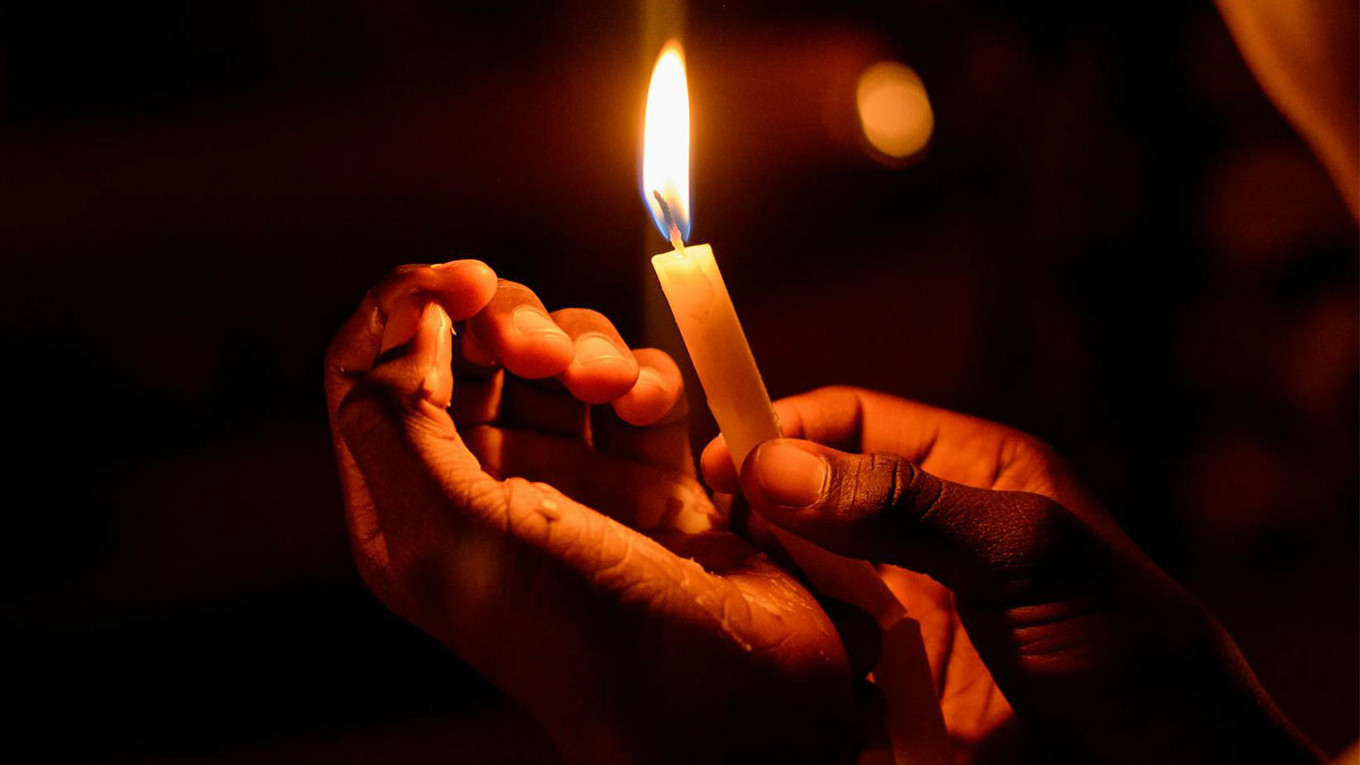Свеча: candle
Here at the Word’s Worth we haven’t done a quiz for a long time. Put down your гаджеты (devices), put your books under your seat, and get out your pencils.
What or who caused the great fire of 1493 in Moscow? A) a faulty chimney; B) a careless priest; C) a drunken cook; D) a pious widow; E) this is a stupid question.
If you chose E, you don’t get a prize. Ever.
The answer is B, the careless priest, who locked up the church Церковь Николая Чудотворца на Песках (St. Nicholas the Wonder Worker on the Sands) near what is now the Arbat without blowing out all the candles that were lit and left by parishioners. The church caught fire from a candle and the blaze quickly spread, destroying a great deal of the city and part of the Kremlin. The candle cost just a kopek.
Hence the phrase: От копеечной свечи Москва сгорела (Moscow burned down from a one-kopek candle). It means: Insignificant acts may have enormous — usually dire — consequences.
So the next time your Significant Other misses a bus, or forgets to mail a letter, or takes the wrong road and says: Ничего-ничего. Какая разница? (Oh, it’s nothing. What’s the difference?) you can piously respond: Москва от копеечной свечки сгорела! (A one-kopek candle burned down Moscow).
It’s satisfyingly annoying.
Russian has a handful of candle expressions, some charming but obscure, some weird, and some useful. Two of them are easy to learn and remember because Russian stole them from French, and English did, too.
One is игра не стоит свеч (the game isn’t worth the candle) which started life as le jeu n’en vaut pas la chandelle. This is from the time before electricity when folks would play card games by candlelight. But if the winnings would be less than the cost of the candles to play by, then it wasn’t worth playing. In other words, the effort won’t pay off.
So when realize you will put in three days of work for one day of salary, you just say: В итоге я решила, что игра не стоит свеч (In the end I decided that it just wasn’t worth the hassle.)
Another French import is жечь свечу с обоих концов (to burn the candle at both ends, brûler la chandelle par les deux bouts). This is when you live life too fully, do too much, and never rest. It could be the necessity of doing two jobs to make ends meet, or the irresistible urge to go out and have fun when you should be inside and asleep. Or both: Высоцкий жёг свою свечу с обоих концов (Vysotsky burned his candle at both ends). This could be the former: Я устал жечь свечу с двух концов, жажду тихого семейного счастья (I'm tired of burning the candle at both ends. I long for the joy of quiet family life.)
When someone says that, nod politely and pretend that family life is quiet.
There is also a philosophical addition to this phrase, apparently homemade in Russia: Eсли жечь свечу с обоих концов, она будет гореть ярче, но сгорит быстрее (If you light a candle at both ends, it will burn more brightly — but burn out more quickly).
Noted.
Then there are a few gruesome and sad candle expressions, one I know because I’d heard about a version of the expression and the act in Moscow a few years ago. Ставить обидящую свечу (to light a wrongdoer’s candle) is not an act of mercy to pray that he or she will mend their ways. It’s to wish their death, at which time you’ll light a candle for them. Grim.
Свеча погасла (the candle went out) is a sad euphemism for the death of spouse or someone dear. Её свеча погасла, она похоронена в земле (Her candle burned out and she lies in the ground).
Although you’d think superstition has no place in church, people also worry when the candle they light in church blows out: Когда в церкви внезапно гаснет свеча, это считается плохой приметой (When your candle suddenly blows out in church, it’s considered a bad omen).
It isn’t. It just means someone didn’t close the door.
Then there is a candle expression that is a bit puzzling at first to non-native speakers, er, me: ни богу свечка ни чёрту кочерга, which is literally “not a candle for God or a poker for Satan.” Кочерга was the heavy tree limb used by a peasant to stir up the fire in his stove. Even though this poker is a useful thing that keeps a family and livestock warm and alive through the winter, the devil also uses a poker to keep the hell fires going.
So it’s rather lofty way of saying: not this or that, neither good nor bad, neither fish nor fowl. Wishy-washy. Nothing special. And even though it seems very folksy and old-fashioned to me, it is used today a fair bit, although probably by older folks.
It is not something you wish to have said about you: А с тобой, говорил, ничего не происходит потому, что ты — ни богу свечка, ни чёрту кочерга (Nothing happens in your life, he said, because you’re nothing special). У других мужья как мужья, а тут — ни богу свечка ни чёрту кочерга! (Other women have husbands who are husbands! But mine is neither fish, nor fowl nor good red herring).
My favorite candle expression was also completely incomprehensible to me at first. A coworker tells you what the boss said to the bookkeeper. You say: Неужели! Ты уверена? (No way! Are you sure?) Your friend replies: Я свечку не держал, но да, уверена. (I wasn't holding a candle, but yes, I'm sure of it.)
What’s the candle doing there?
There are several versions of the origin of this saying, all rather unsavory. The most widespread is that in the old, old days when a couple got married, it was in the interests of the bride and groom’s parents to make sure that the marriage was consummated — and, in some cases, that the bride was a virgin. So when the couple went to bed, the in-laws stood around holding candles and watching.
In another version, when the master and mistress of a house went to bed, they would have a servant stand and hold a candle until they fell asleep.
So держать свечку means to witness or hear something personally, and не держать свечку means “I wasn’t an eyewitness” – and is followed by either “но верю” (but I believe it) or “не знаю.”
It’s often a reply to a question: Ты уверен что сын сломал машину? (Are you sure his son wrecked his car?) Ну, я свечку не держал, но он последний кто брал ключи (Well, I didn't see it, but he was the last one to take the keys).
Here’s another example: Я не держал свечку, не служил ни в ГРУ, ни в СВР, не вхожу в ближнее окружение Путина, не являюсь ни историком разведки, ни экспертом по нервно-паралитическим веществам (I wasn't an eyewitness, I never worked in the Main Intelligence Directorate or the Foreign Intelligence Service, I'm not in Putin's entourage, I'm not a historian of intelligence services or an expert in neuro-paralytic substances).
But…
A Message from The Moscow Times:
Dear readers,
We are facing unprecedented challenges. Russia's Prosecutor General's Office has designated The Moscow Times as an "undesirable" organization, criminalizing our work and putting our staff at risk of prosecution. This follows our earlier unjust labeling as a "foreign agent."
These actions are direct attempts to silence independent journalism in Russia. The authorities claim our work "discredits the decisions of the Russian leadership." We see things differently: we strive to provide accurate, unbiased reporting on Russia.
We, the journalists of The Moscow Times, refuse to be silenced. But to continue our work, we need your help.
Your support, no matter how small, makes a world of difference. If you can, please support us monthly starting from just $2. It's quick to set up, and every contribution makes a significant impact.
By supporting The Moscow Times, you're defending open, independent journalism in the face of repression. Thank you for standing with us.
Remind me later.







